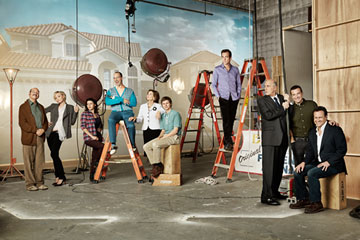
On set with the cast of Arrested Development.
There is no aspect of Arrested Development so perfect that creator Mitch Hurwitz does not think he can improve it, including the way Jason Bateman demonstrates his love to Michael Cera. Hurwitz is going over a red-penciled script, revised on the fly, for a scene in which Michael Bluth (Bateman) is on the verge of a confession to his son George-Michael (Cera). "I think what would be great here is a hug," Hurwitz says, putting his hands on Cera's shoulders, pulling him in and giving him a gentle peck on the cheek.
Then Hurwitz heads back to his director's chair. "Let's make some streaming media, people!" he declares. "Let's make something for some people's phones!"
It feels like I've been here before, and in a way, I have. In 2004, I watched Bateman and Cera shoot scenes for Arrested Development, on much the same sets, on the 20th Century Fox lot across town. The Fox network sitcom, about a wealthy, dysfunctional family in Newport Beach, Calif., was just starting its sophomore season and was riding high on prestige, if not ratings. It had just won five Emmys, including Best Comedy. It was ambitious, joke-dense and even prescient: years before Lehman Brothers collapsed, the Bluths made their fortune on specious real estate deals, after humble beginnings that included running a frozen-banana business. (A key refrain: "There's always money in the banana stand!") That second season, Fox and Hurwitz hoped, would be the year the show broke big.
It didn't. The show ran one more, truncated third season and was canceled in 2006. Talks to move it to Showtime fell through. Periodically, there were noises of a reunion or a movie--the kind of magical thinking that fans of shows from Deadwood to Jericho know too well. (The five stages of cult-TV death are denial, anger, denial, denial and denial.) But come on. No TV network was ever going to make Arrested Development again.
And no TV network ever did. Instead, a new 15-episode season of Arrested Development will be released May 26 on Netflix, the onetime movies-by-mail service that's bidding to become the HBO of on-demand streaming video.
And notwithstanding Hurwitz's quip about phones, the shoot looks for all the world like a full-scale network-TV production. The entire lead cast has returned, albeit on a staggered schedule. (Cera was also hired on as a staff writer.) The producers brought back most of the guest stars who appeared over three seasons on Fox--Liza Minnelli, Ben Stiller, Henry Winkler and many more--and added a slew of new ones, including Isla Fisher, Conan O'Brien and Kristen Wiig. The full season, Hurwitz says, should run about 8½ commercial-free hours, longer than a full broadcast season. There's even a stair car. (The production rented one to replace the Bluth family airport-service vehicle that was prominent in the Fox show.)
In a real way, it's not just Arrested Development that's being rebooted here; it's the entire TV business. Netflix, which earlier this year premiered the Kevin Spacey political drama House of Cards (at a reported production cost of $100 million for two seasons), is betting big on a future in which original TV comes through the Internet, via computers, set-top boxes or sundry iThingies. When Arrested was canceled, it was a blip in network-TV history. But the revived version could be the biggest thing in whatever TV is about to become.
